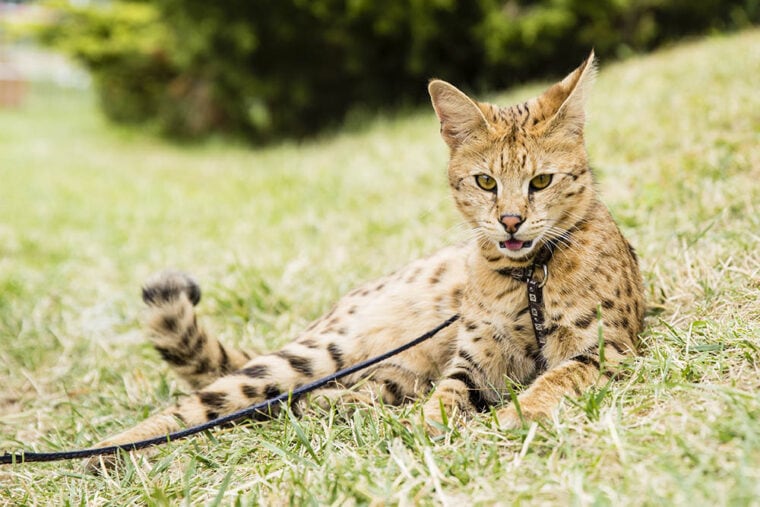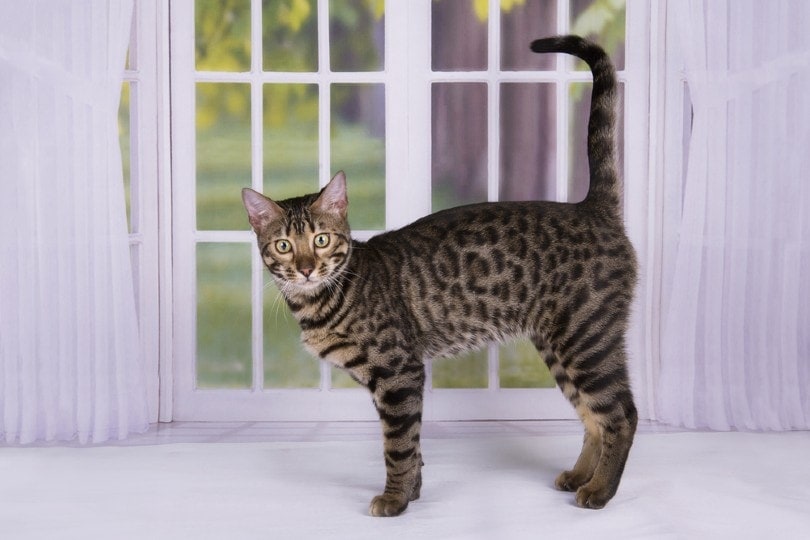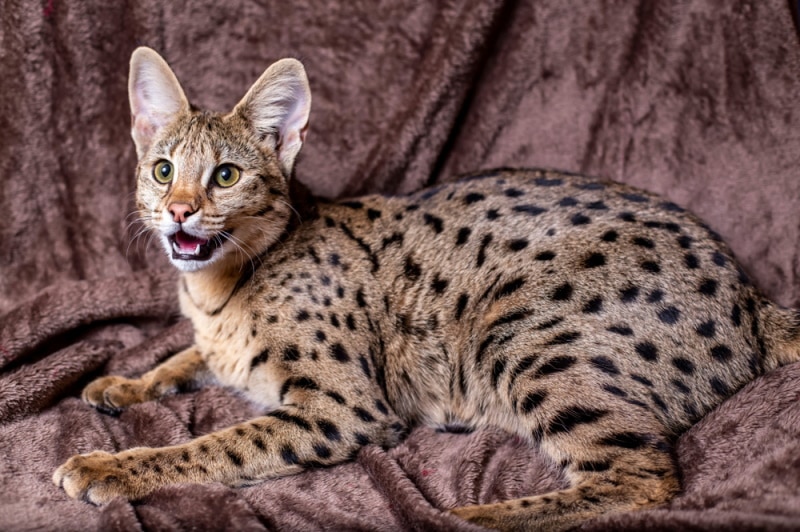
The Savannah cat boasts impressive strength and agility, and their loyalty can be compared to a dog’s, making them a good alternative to large canines. These unique features are unsurprising because the cat is a crossbreed between a serval and a domesticated cat. Early records show Judee Frank was the first person to breed them.
She crossbred a male serval with a domesticated Siamese cat to produce a cat named Savannah. Today the name still stands, and Savannah cats, in general, are not dangerous.
Why Do Savannah Cats Look So Dangerous?
Compared to domesticated cats, the Savannah’s slender and tall body looks imposing. The cat can reach a height of 19 inches, as in the wild, the serval must be tall to make long leaps toward their prey.
Other features are extra-large ears and spotted bodies, which are also not common in domesticated animals. Additionally, Savannahs with more serval genes hiss or growl, a mode of communication when the cat is excited and happy.
While the cat may look terrifyingly large, don’t be misled by their outward appearance. A Savannah cat is generally passive and not dangerous, especially in later generations.

Is Owning a Savannah Cat Legal in the USA?
Rules and regulations behind the ownership of a Savannah are restricted to the state level. But they must meet guidelines set by the Department of Agriculture and Fish and Wildlife Services.
States that allow ownership of Savannah cats:
Alabama, Arizona, Arkansas, Connecticut, Florida, Illinois, New Jersey, North Carolina, and North Dakota are some of the states that allow all generations of Savannah cats.
States that have control over ownership of Savannah cats:
In Alaska, Colorado, Massachusetts, New Hampshire, Vermont, and Iowa, F4 Savannahs are allowed without a license. However, in some city limits, such as Denver and Seattle, cat ownership is banned despite their respective states allowing them in countryside regions and areas around small towns.
In Maryland, all generations of the cat are allowed, provided their weight is less than 30 pounds.
Lastly, in Texas, some counties that allow ownership are Bell, Ward, Lubbock, Mason, Guadeloupe, and Harris. Montgomery County regulates the ownership of F1, F2, and F3 cats. Unfortunately, most of the state’s 254 counties have banned Savannah cat ownership. The same ban also spills over to breeders.
States that do not allow the ownership of Savannahs:
It is illegal to have a Savannah cat in Georgia, Hawaii, and Rhodes Island.
Note: With more and more people lobbying for exotic animals, some of the states with the strictest laws on Savannah cats may loosen the regulations. Visit your state’s resource center to find out more about the cat’s ownership.

Why Are F1, F2, and F3 Cats Regulated in Many States?
Generations of Savannah cats are commonly known as F1, F2, and F3. An F1 Savannah is born by breeding a wild serval and a domestic cat, so the cat’s genes are 50% of that of a wild serval. With a serval being known for its strong hunting skills and aggressiveness towards other pets, you don’t want your domesticated Savannah cat to have those skills. Unfortunately, F1 cats are still somewhat wild, and this might be one of the reasons legislators don’t want them in family settings.
Conclusion
Savannah cats are considered safe as there are practically no reports of injuries despite their imposing appearance. The cats are tall, slender, and have playful personalities. However, some generations are illegal or restricted in many states. So, before buying one, make sure you have the right permits.
Featured Image Credit: Jarry, Shutterstock







